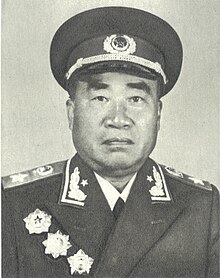Zhu De
Zhu De ( Chinese 朱德 , Pinyin Zhū Dé , W.-G. Chu Teh ; * December 1, 1886 in Yilong ; † July 6, 1976 in Beijing ) was for many years the supreme commander of the Chinese People's Liberation Army and its forerunners. After the founding of the People's Republic of China , he held more representative state offices and was head of state from 1975 until his death , as chairman of the Standing Committee of the National People's Congress for many years . He is considered an important military strategist during the revolutionary era .
Life
The son of a large family from Yilong County in Sichuan Province studied at a teacher training college in Chengdu before joining the army and then worked as a physical education teacher for a year. From 1908 he attended the Military Academy of Yunnan in Kunming , where he taught after completing his studies.
In the early years of the Chinese Republic , he took part in warlord campaigns in the Yunnan region and commanded units on the border with Vietnam and Laos . During this time he became heavily dependent on opium , but was able to overcome the addiction in a Shanghai hospital in 1919.
In Shanghai , Zhu familiarized himself with the ideas of Marxism and Leninism . In the 1920s he went to Europe and studied from 1924 to 1925 at the Georg-August University in Göttingen. During this time he joined the Chinese Communist Party . His admission was not without controversy, the then party leader Chen Duxiu declined membership because of Zhu's past. However, Zhou Enlai's advocacy paved the way into the party.
The activities of Zhu - who studied less than published newspapers and visited museums and industrial sites - in connection with his past were also not entirely comfortable with the German authorities. After being arrested twice for revolutionary activities and finally expelled from Germany, Zhu traveled to the Soviet Union in 1925 to study military affairs at a college set up for Asian students before returning to China in 1926.
Zhu's close relationship with Mao Zedong began after the unsuccessful Nanchang uprising in 1927, as a result of which both insurgents fled to the Jinggang Mountains . Zhu De and Mao Zedong succeeded in building up a powerful guerrilla organization with the survivors , which was not only able to hold the communist area of influence in China, but even to expand it. During this time, Zhu gained immense prestige due to his bravery and military leadership.
During the Long March , Zhu and Zhang Guotao commanded the western arm of the Red Army, which only survived the retreat through Sichuan Province with difficulty. Zhu led the reconstruction of the Red Army in Yan'an (under Mao's political leadership) . In the Sino-Japanese War (1937–1945) and the Chinese Civil War (1945–1949) Zhu was Commander-in-Chief of the Red Army. After 1945, Zhu was appointed commander in chief of the People's Liberation Army and was vice chairman of the CCP. During the great leap forward he supported Mao Zedong in his industrialization projects and, unlike Zhou Enlai, advocated strengthening exports in order to import heavy industry and machines.
Zhu Den remained a respected statesman until his death in 1976: from April 28, 1959, he was chairman of the Standing Committee of the National People's Congress , which, with the new constitution from January 17, 1975, also included the post of head of state, which he took until his death.
Works
- Selected Works of Zhu De. Foreign Languages Press, Beijing, 1986.
literature
- Agnes Smedley : The Great Road: The Life and Times of Chu Teh , Monthly Review Press (NY) 1956 (biography)
- Chu Teh , in: Internationales Biographisches Archiv 42/1976 of October 4, 1976, in the Munzinger Archive ( beginning of article freely available)
Web links
Single receipts
- ↑ Jürgen Domes : Politics and Rule in Rotchina , W. Kohlhammer-Verlag, Stuttgart, Berlin, Cologne, Mainz 1965, p. 158, note 11
- ^ Frank Dikötter: Mao's Great Famine: The History of China's Most Devastating Catastrophe, 1958–1962 . Bloomsbury, London 2010, ISBN 978-1-4088-1219-8 , p. 79
- ↑ Information about the creation of the book here
| personal data | |
|---|---|
| SURNAME | Zhu De |
| ALTERNATIVE NAMES | Zhū Dé; Chu Teh (Chinese) |
| BRIEF DESCRIPTION | Chinese Marshal |
| DATE OF BIRTH | December 1, 1886 |
| PLACE OF BIRTH | Yilong |
| DATE OF DEATH | July 6, 1976 |
| Place of death | Beijing |


